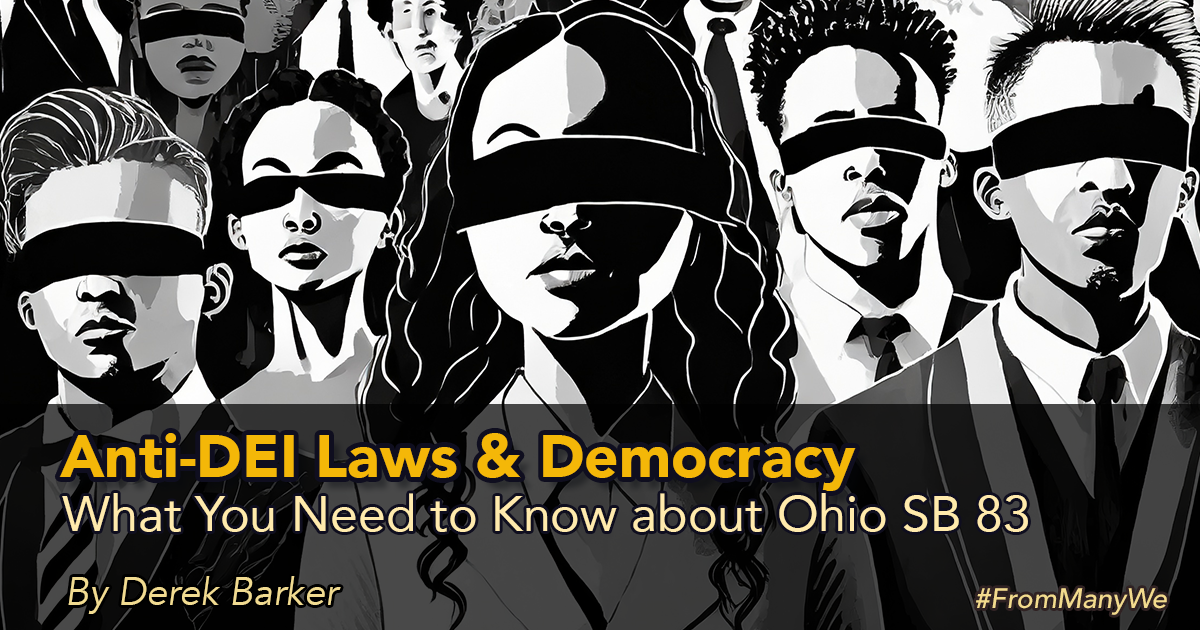News & Ideas - Anti-DEI Laws and Democracy: What You Need to Know about Ohio SB 83

By Derek W. M. Barker
Ohio’s proposed SB 83 higher education bill quietly moved to the cusp of becoming law at the end of the state legislative session in December 2023. Perhaps you’ve seen headlines about bills like this around the country and are wondering what this is all about. Here are some essential facts about Ohio’s SB 83 and the larger national campaign against diversity, equity, and inclusion (DEI) programs in higher education. Not only is SB 83 an attack on higher education but it also represents a growing threat to democracy in Ohio and beyond.
What Is SB 83?
SB 83 is a higher education reform bill to restrict DEI programs at state colleges and universities. Ohio’s 66-page law is similar to model legislation that has been introduced around the country by conservative think tanks and activists and enacted in states like Florida and Texas. The bill proposes to:
- Prohibit mandatory diversity trainings;
- Prohibit the use of diversity statements in hiring;
- Require universities to demonstrate “intellectual diversity” for course approval;
- Prohibit statements on controversial issues; and
- Require institutions to officially respond to any student or faculty allegations of violations of these policies.
What Is the Status of SB 83?
The bill passed the Ohio Senate in May of 2023. A revised version passed a House committee by an 8–7 vote on December 6. The bill is currently pending a vote of the whole House, which could happen as soon as January 2024.
How Do Anti-DEI Laws Harm Democracy?
Laws like SB 83 may seem innocuous. However, they are an example of authoritarian creep in several ways.
They reduce the educational benefits of diverse campuses. Beginning with education, the integration of our society is widely regarded as critical to the long-term health of our democracy. Diverse college campuses benefit our democracy by providing equal access to careers and entry into the middle class while providing safe spaces for students to better understand and learn from one another. Colleges and universities have become more diverse since integration was legally required by the Civil Rights Act of 1964; however, that integration was met with various forms of resistance, including violence. Programs to ensure and protect DEI have evolved out of the need to ensure compliance with the law and have created campus environments that are welcoming for students of all backgrounds. Efforts to restrict DEI threaten to undermine the progress within higher education that has helped move America toward becoming a flourishing multiracial and diverse democracy.
A chilling effect. On the surface, anti-DEI laws use deceptively neutral language, like “intellectual diversity” and “controversial issues.” However, in the political context, the intent behind them is clear: to discourage campuses from having honest discussions of American history, racial inequality, and other forms of exclusion. As noted by the ACLU of Ohio, a campus pride celebration could be considered a controversial event. As Eduardo Padron, former president of Miami-Dade College, says, “The faculty are living under tremendous intimidation, and fear, and anxiety… It’s really autocracy at its best.”
Anti-DEI laws are out of step with the public. A recent survey by the Chronicle of Higher Education asked, Who should influence what’s taught in college? Only 37 percent of both Democrats and Republicans thought this was the job of state legislators. While broad majorities of both groups supported college professors to determine the curriculum, Republicans also favored a role for business and industry to influence curriculum. Ohio’s Republican-controlled legislature has supported more extreme policies than the general public on numerous issues, including marijuana legalization and reproductive freedom. SB 83 is the latest example of the disconnect between policymakers and public opinion.
Who Supports and Who Opposes SB 83?
During a seven-hour hearing in Ohio in April 2023, more than 100 students, faculty, and higher education supporters spoke against the bill. Only five educators spoke in favor of the bill in committee hearings in March.
What Does This Have to Do with Gerrymandering?
It is not a coincidence that SB 83 is being proposed in a heavily gerrymandered state. Ohio voted Republican in 2020 by 53 percent to 45 percent, yet the legislature is controlled by 26 to 7 and 67 to 32 Republican majorities in the Senate and House, respectively. These disproportional majorities are due to the design of state electoral districts that allow legislators to avoid accountability to effectively create a system of one-party rule.
What Can We Do?
See here for more information on SB 83 and how you can act.
See here for more information on the Citizens Not Politicians redistricting campaign.
Derek W. M. Barker is a program officer at the Charles F. Kettering Foundation, a political theorist, and the lead editor of the foundation’s blog series From Many, We.
From Many, We is a Charles F. Kettering Foundation blog series that highlights the insights of thought leaders dedicated to the idea of inclusive democracy. Queries may be directed to fmw@kettering.org.